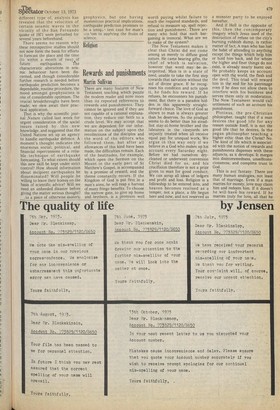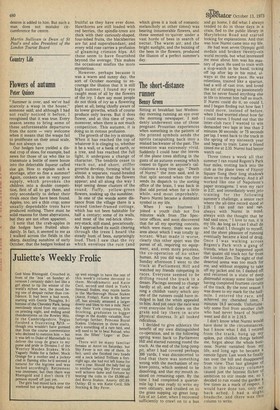Religion
Rewards and punishments
Martin Sullivan
'There are many features of New Testament teaching which puzzle the modern reader and none more than its repeated references to rewards and punishments. They cannot be ignored and if they are not capable of a rational explanation, they reduce our faith to a crude level. We may accept that we are dependent for our information on the subject upon the recollections of the disciples and the word of the editors who followed them, but after all allowances of this kind have been made, the difficulties remain. Each of the beatitudes, for example, which open the Sermon on the Mount in the early part of St Matthew's Gospel, is accompanied by a promise of reward, and the theme constantly recurs. If the Kingdom of God is put first 'in a man's aims, he will reap a harvest of many fringe benefits. To choose the narrow gate, to give up home and.brethern, is a premium well worth paying whilst failure to reach the required standards, and refusal to measure up, spell rejection and punishment. There are many who hold that such bargaining is immoral. What are we to make of the system?
The New Testament makes it ' clear that Christ did not come among us merely to diffuse good nature. He came bearing gifts, the chief of which is salvation, however that word may be interpreted: Man is in a state of need, unable to take the first step towards that salvation without the aid of divine grace. If he recognises his condition and acts upon it, he finds his reward. If he refuses, he encounters his punishment. But there is a paradox hidden in this apparently straightforward choice. The love of God as shown to man is always greater than he deserves. So the prodigal seems to do better than his steadfast stay-at-home brother and the labourers in the vineyards are unjustly treated when all receive equal pay for unequal work. We argue in this way only if we believe in a God who makes up his account every Saturday night. Before we had ourselves drycleaned or underwent conversion Christ died for us, and his crucifixion therefore is not a prize given to man for good conduct.
We can scrap all ideas of ledgers and profit and loss. Religion is a fellowship to be entered into, and heaven becomes realised as a temper, not a place, a life ,begun here and now, and not reserved as a monster party to be enjoyed hereafter.
And if Hell is the opposite of this, then the contemporary imagery which Jesus used of the destruction of refuse on the city's burning rubbish dump, is rather' matter of fact. A man who has lost the habit of attending to anything, except the things Which help him or hold him back, and for whom the higher and finer things do not exist, is already nearly burnt out. He probably keeps an account open with the world, the flesh and the devil. This triad will reward him in the end for his patronage even if he does not allow them to interfere with his business and serves them only in moderation. The New Testament would call settlement of such an accbunt his punishment.
Plotinus, the pre-Christian philosopher, taught that if a man desires the good life for any reason outside itself, it is not the good life that he desires. Is the pagan philosopher teaching a higher ethic than the Christ? No. The kind of life which is associated with the notion of rewards and punishments dispenses with these adjuncts, as it develops. It merges into disinterestedness, unselfconsciousness, and complete trust in God.
This is not fantasy. There are many human analogies, not least that of marriage. Even if a man marries for money, love may claim him and redeem him. If it doesn't he will have his reward. If he marries truly for love, all that he desires is added to him. But such a man does not mistake circumference for centre.
Martin Sullivan is Dean of St Paul's and also President of the London Tourist Board



































 Previous page
Previous page